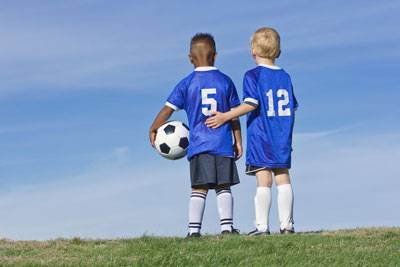 There are a variety of benefits to enrolling your children in youth sports programs. There’s the physical fitness aspect, as kids get the exercise they need to stay fit and active. It’s a grade booster, as studies show that those who participate in youth sports are more likely to do better in the classroom. Above all, however, sports are fun. It can be very rewarding to watch your children dedicate themselves to a sport while having a great time in the process.
There are a variety of benefits to enrolling your children in youth sports programs. There’s the physical fitness aspect, as kids get the exercise they need to stay fit and active. It’s a grade booster, as studies show that those who participate in youth sports are more likely to do better in the classroom. Above all, however, sports are fun. It can be very rewarding to watch your children dedicate themselves to a sport while having a great time in the process.
While there are a bevy of benefits to youth sports, there’s one big benefit that may not necessarily be top of mind: career building. Youth sports help provide career-building skills that will benefit children years down the line when they’re in the workforce. Here’s a look at some of the ways youth sports provides career-building skills:
Preparation: They say practice makes perfect. Thus, not only is it important to hone your skills at a particular craft by putting in the practice hours, but it’s also important to prepare for the game or task at hand from a strategic standpoint. This is also true in life. In the classroom, you’ll have to prepare for tests. In the workforce, you’ll have to prepare for interviews. After you’ve gotten the job, you’ll likely have to plan presentations for clients or bosses. Planning and preparation is an important part of a career, and it can all begin with the important details one learns before the big youth championship game.
Getting along with others: As your child plays sports, it’s highly unlikely that he/she will be friends with every single teammate. The same can be said about the working world. You’re not going to get along with everyone you work with and everyone you do business with. However, just as it’s important on a team, in your career, you have to put differences aside and come together for the greater good. On a youth sports team, this greater good is doing what it takes to win the game. In the career world, this greater good is doing what it takes to accomplish sales goals or attract new business.
...
 We all know — games are more fun. More fun for the kids. More fun for the parents. In a typical training session, the most common question asked by the players is “when are we going to scrimmage?” As trainers, we have been taught to let the “game be the teacher” but, why is training more advantageous to developing players than games? The answer is MATH.
We all know — games are more fun. More fun for the kids. More fun for the parents. In a typical training session, the most common question asked by the players is “when are we going to scrimmage?” As trainers, we have been taught to let the “game be the teacher” but, why is training more advantageous to developing players than games? The answer is MATH.



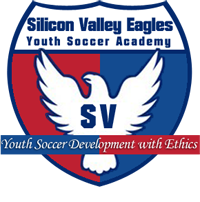
 Making it in soccer is difficult. Training programs and players have improved dramatically in the past 15 years. Worldwide exposure has grown the sport and our knowledge about the development of elite athletes is progressing every day. To make it to the elite levels of soccer it takes a combination of skill, resources, luck, and opportunity. But even on this treacherous development journey, a player still has a lot of control. Through observation and research, we have learned that elite youth athletes exhibit similar thinking processes and behavior.
Making it in soccer is difficult. Training programs and players have improved dramatically in the past 15 years. Worldwide exposure has grown the sport and our knowledge about the development of elite athletes is progressing every day. To make it to the elite levels of soccer it takes a combination of skill, resources, luck, and opportunity. But even on this treacherous development journey, a player still has a lot of control. Through observation and research, we have learned that elite youth athletes exhibit similar thinking processes and behavior. The biggest mistakes I see from youth soccer coaches, whether they be parent, or worse, they are paid to coach, is the failure to follow teaching progressions and failure to communicate with youth players. Coaches that teach complex ideas using foreign soccer jargon to 8-12 year old “competitive” soccer players waste time. It also waste an opportunity to teach. Why do we do it?
The biggest mistakes I see from youth soccer coaches, whether they be parent, or worse, they are paid to coach, is the failure to follow teaching progressions and failure to communicate with youth players. Coaches that teach complex ideas using foreign soccer jargon to 8-12 year old “competitive” soccer players waste time. It also waste an opportunity to teach. Why do we do it?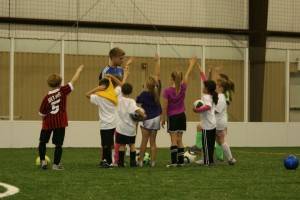 It is that time of year again…tryouts for youth soccer teams. Or rather, it is the hunting season for clubs and coaches to recruit players and find new investors. So, having 5 kids in the system and being a licensed coach, I thought I would add a list of questions and answers for parents for this time of year. I seem to keep having the same conversations so it would be easier just to put the information here:
It is that time of year again…tryouts for youth soccer teams. Or rather, it is the hunting season for clubs and coaches to recruit players and find new investors. So, having 5 kids in the system and being a licensed coach, I thought I would add a list of questions and answers for parents for this time of year. I seem to keep having the same conversations so it would be easier just to put the information here: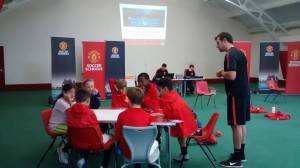 We are halfway through what soccer coaches refer to as “camp season.” This is the time that paid coaches for clubs have available time to make some extra money in the form of “camps.” And that is the first thing that your should know … camps are about money to clubs and coaches not skill development of individual players.
We are halfway through what soccer coaches refer to as “camp season.” This is the time that paid coaches for clubs have available time to make some extra money in the form of “camps.” And that is the first thing that your should know … camps are about money to clubs and coaches not skill development of individual players. Like it or not, sports come with pressure. There will come a time when your young athlete gets the ball with the clock winding down or steps up with the bases loaded. When that happens, mental toughness often determines whether or not they’ll succeed. Even though you can’t be on the field or the court with your young athlete during these situations, there’s plenty you can do to help beforehand. Here are five methods to get you started.
Like it or not, sports come with pressure. There will come a time when your young athlete gets the ball with the clock winding down or steps up with the bases loaded. When that happens, mental toughness often determines whether or not they’ll succeed. Even though you can’t be on the field or the court with your young athlete during these situations, there’s plenty you can do to help beforehand. Here are five methods to get you started. Go climb a tree!
Go climb a tree!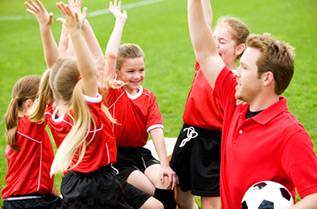 Relationships with coaches can be tricky to navigate, but the key to any solid player-coach relationship can be answered with a simple question:
Relationships with coaches can be tricky to navigate, but the key to any solid player-coach relationship can be answered with a simple question: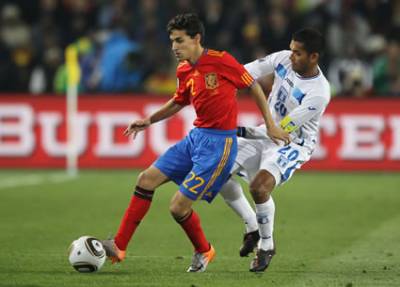 No matter your sport or age, anyone who’s ever played has felt those pre-game “butterflies” in their stomach. Some of us also get the sweats even before we set foot on the field or in the arena. And in the extreme, you might feel your heart pump so rapidly, you think you’re about to faint.
No matter your sport or age, anyone who’s ever played has felt those pre-game “butterflies” in their stomach. Some of us also get the sweats even before we set foot on the field or in the arena. And in the extreme, you might feel your heart pump so rapidly, you think you’re about to faint.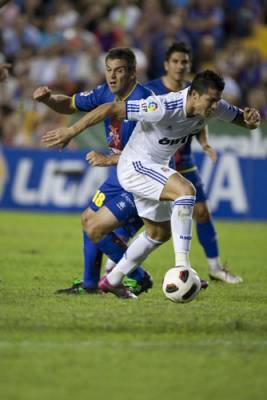 Each week in the world’s top soccer leagues, injuries take an expensive toll. Millions of dollars of talent left on the substitutes bench or back in the training room, risking their team’s place in the standings.
Each week in the world’s top soccer leagues, injuries take an expensive toll. Millions of dollars of talent left on the substitutes bench or back in the training room, risking their team’s place in the standings.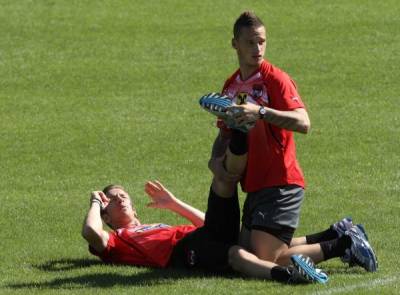 Parents, surely you realize that you are your child’s first and most influential teacher/coach. The stimulation and support you provide can instill a desire for your child to want to improve. So, it is important that you make learning experiences as fun as possible in the hope that your child will eventually become self-motivated to want to improve.
Parents, surely you realize that you are your child’s first and most influential teacher/coach. The stimulation and support you provide can instill a desire for your child to want to improve. So, it is important that you make learning experiences as fun as possible in the hope that your child will eventually become self-motivated to want to improve.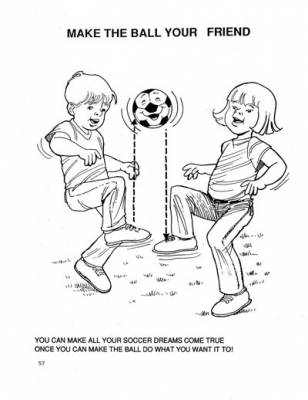 Typical Instruction:
Typical Instruction: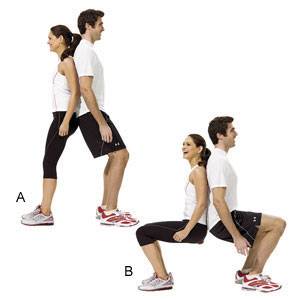 As the soccer season begins, all youth soccer players are excited to start playing again. One thing to remember is that many injuries happen at the beginning of the season. Many of these injuries can be preventable! Below are some tips to help stay injury free for this soccer season and beyond:
As the soccer season begins, all youth soccer players are excited to start playing again. One thing to remember is that many injuries happen at the beginning of the season. Many of these injuries can be preventable! Below are some tips to help stay injury free for this soccer season and beyond: Practices are a good way to test what snacks work best for your child in regards to energy and performance. Just as the old adage goes for adult athletes, “Do not try anything new on race day;” this also can be applied to youth soccer players. Testing what food works well for pre/post practice can then be applied to pre/post games.
Practices are a good way to test what snacks work best for your child in regards to energy and performance. Just as the old adage goes for adult athletes, “Do not try anything new on race day;” this also can be applied to youth soccer players. Testing what food works well for pre/post practice can then be applied to pre/post games. Kids love to move. They love to jump and climb and tumble and, as their coordination improves, to throw and catch.
Kids love to move. They love to jump and climb and tumble and, as their coordination improves, to throw and catch. Our kids learn from what we say and do. Don’t we all want to be the kind of sports parent that teaches good sportsmanship, teamwork and respect? Here is some simple advice on how to be the best sports parent before, during and after the game.
Our kids learn from what we say and do. Don’t we all want to be the kind of sports parent that teaches good sportsmanship, teamwork and respect? Here is some simple advice on how to be the best sports parent before, during and after the game.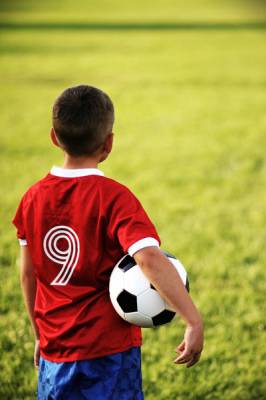 Let’s face it: most athletes, particularly teenage athletes, are mentally under-trained. While they might acknowledge that the mind is important to their sport, they don’t always have a plan to integrate mental skills into their physical training. Just like physical skills, there are some mental skills that athletes have, and some that they need to learn.
Let’s face it: most athletes, particularly teenage athletes, are mentally under-trained. While they might acknowledge that the mind is important to their sport, they don’t always have a plan to integrate mental skills into their physical training. Just like physical skills, there are some mental skills that athletes have, and some that they need to learn. There are a variety of benefits to enrolling your children in youth sports programs. There’s the physical fitness aspect, as kids get the exercise they need to stay fit and active. It’s a grade booster, as studies show that those who participate in youth sports are more likely to do better in the classroom. Above all, however, sports are fun. It can be very rewarding to watch your children dedicate themselves to a sport while having a great time in the process.
There are a variety of benefits to enrolling your children in youth sports programs. There’s the physical fitness aspect, as kids get the exercise they need to stay fit and active. It’s a grade booster, as studies show that those who participate in youth sports are more likely to do better in the classroom. Above all, however, sports are fun. It can be very rewarding to watch your children dedicate themselves to a sport while having a great time in the process.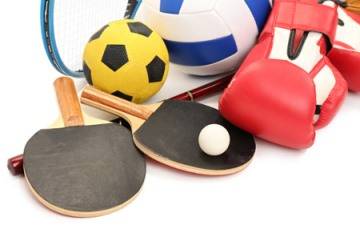 There are a bevy of benefits for kids who play multiple sports. These include becoming better overall athletes from engaging in multiple disciplines; learning to be smarter and more creative players; and staying more active and having more fun in athletics. In addition, research shows that the majority of athletes who go on to play college sports come from multi-sport backgrounds.
There are a bevy of benefits for kids who play multiple sports. These include becoming better overall athletes from engaging in multiple disciplines; learning to be smarter and more creative players; and staying more active and having more fun in athletics. In addition, research shows that the majority of athletes who go on to play college sports come from multi-sport backgrounds. As a former coach with well over 30 years of experience helping young people learn to play soccer and learn life lessons on the field, I’ve seen some changes over the years. Equipment has gotten more expensive and fields have gotten nicer, but there are changes in the parents and the way things are run as well. Here’s my take on what I saw 30 years ago and what I’m seeing today.
As a former coach with well over 30 years of experience helping young people learn to play soccer and learn life lessons on the field, I’ve seen some changes over the years. Equipment has gotten more expensive and fields have gotten nicer, but there are changes in the parents and the way things are run as well. Here’s my take on what I saw 30 years ago and what I’m seeing today.

